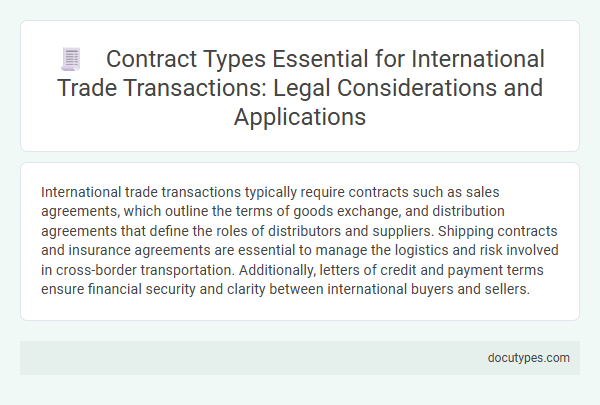International trade transactions typically require contracts such as sales agreements, which outline the terms of goods exchange, and distribution agreements that define the roles of distributors and suppliers. Shipping contracts and insurance agreements are essential to manage the logistics and risk involved in cross-border transportation. Additionally, letters of credit and payment terms ensure financial security and clarity between international buyers and sellers.
Introduction to International Trade Contract Types
International trade involves diverse contract types that govern the exchange of goods and services across borders. These contracts provide clear terms and protect the interests of all parties involved in cross-border transactions.
You must understand contracts such as sales agreements, shipping contracts, and letters of credit to ensure smooth international trade operations. Each contract type addresses specific aspects like delivery terms, payment methods, and dispute resolution.
Sales Contracts: Core Elements and Applications
Sales contracts are fundamental in international trade, establishing the terms and conditions for the exchange of goods between parties in different countries. These contracts must clearly define the obligations, rights, and responsibilities of buyers and sellers to avoid disputes.
Core elements of sales contracts include product description, quantity, price, delivery terms, payment methods, and dispute resolution mechanisms. Precise inclusion of Incoterms, governing law, and language of the contract enhances clarity and enforceability in cross-border transactions.
Distribution Agreements: Legal Frameworks and Considerations
Distribution agreements are essential contracts in international trade that define the relationship between suppliers and distributors across different jurisdictions. These agreements establish legal frameworks that regulate rights, obligations, and dispute resolutions to ensure smooth cross-border commercial operations.
- Legal Frameworks - Distribution agreements must comply with international trade laws, including the United Nations Convention on Contracts for the International Sale of Goods (CISG), and relevant national regulations.
- Territorial Rights - These contracts specify exclusive or non-exclusive rights for distributors within designated geographic areas, protecting market interests and preventing conflicts.
- Dispute Resolution - Provisions typically include mechanisms such as arbitration clauses or choice of law to address potential disputes efficiently and reduce litigation risks in multiple jurisdictions.
Agency Contracts: Risk Allocation and Rights
Agency contracts in international trade define the relationship between principals and agents, specifying duties and authorities. These contracts allocate risks by clarifying liability for third-party interactions and potential damages. Rights granted typically include negotiation powers, contract execution, and commission entitlements, ensuring clear operational frameworks.
Licensing Agreements in Cross-Border Transactions
Licensing agreements play a crucial role in international trade transactions by allowing one party to grant another the rights to use intellectual property across borders. These contracts define terms related to royalties, duration, territory, and scope of use, ensuring legal protection for both licensors and licensees. Effective licensing agreements help mitigate risks and promote compliance with varying international laws and regulations.
Joint Venture Contracts: Structuring International Partnerships
Joint venture contracts are essential in international trade to establish clear partnerships and shared responsibilities between parties from different countries. These agreements outline contributions, profit sharing, and management roles, reducing risks in cross-border collaborations.
- Definition and Purpose - Joint venture contracts formalize cooperation between businesses to pursue specific international trade objectives.
- Key Components - These contracts detail capital contributions, decision-making authority, profit distribution, and dispute resolution mechanisms.
- Your Role and Liability - You will have defined obligations and protections that clarify your participation and limit potential legal exposure in the collaboration.
Transportation and Logistics Contracts: Legal Compliance
Transportation and logistics contracts are essential in international trade transactions to ensure the timely and secure movement of goods across borders. These contracts must comply with international regulations such as the Incoterms rules established by the International Chamber of Commerce (ICC).
Legal compliance in transportation contracts covers carrier liability, customs clearance, and insurance requirements under conventions like the CMR, Hague-Visby Rules, or the Rotterdam Rules. Logistics agreements should define roles for freight forwarders, warehouse operators, and customs brokers to manage risk effectively. Failure to adhere to applicable international laws and standards can result in significant financial and legal penalties.
Service Agreements in Global Trade
What types of contracts are essential for international trade transactions? Service agreements play a critical role in global trade by defining the scope, standards, and terms of service delivery between parties from different countries. These contracts ensure clarity, compliance with local and international laws, and reduce risks associated with cross-border service provision.
Dispute Resolution Clauses in International Contracts
International trade transactions involve various types of contracts that define the terms of trade, rights, and obligations of the parties involved. Dispute resolution clauses are crucial in these contracts to manage conflicts and ensure smooth enforcement across different legal systems.
- Arbitration Clauses - Specify arbitration as the method for resolving disputes, often preferred for neutrality and enforceability under the New York Convention.
- Choice of Law Clauses - Determine which jurisdiction's laws will govern the contract, reducing uncertainty in legal interpretations.
- Forum Selection Clauses - Designate the physical or institutional venue where disputes will be adjudicated to prevent jurisdictional conflicts.
Including clear dispute resolution provisions in international contracts mitigates risks and facilitates effective conflict management in cross-border trade.
What Types of Contracts Are Required in International Trade Transactions? Infographic

